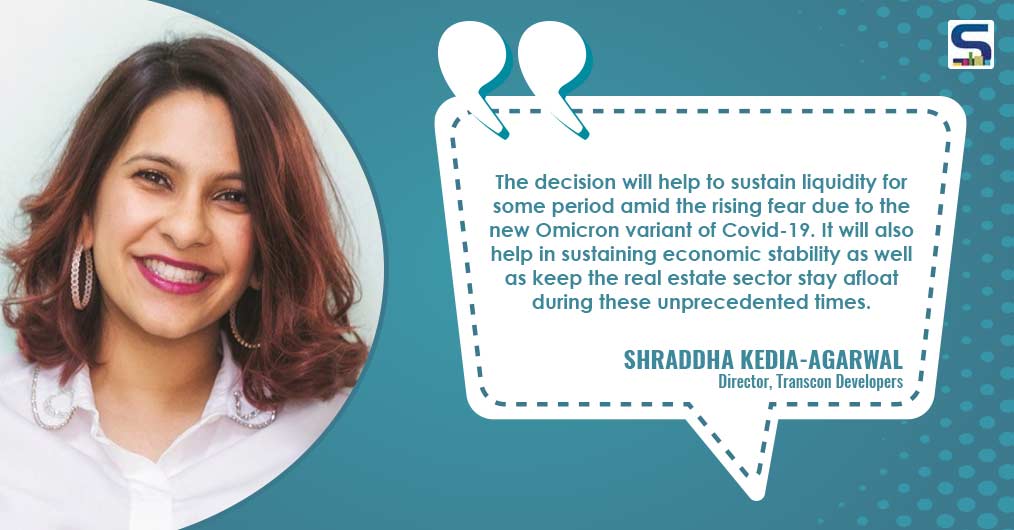Real Estate Year-End Review and Outlook for 2022 By Shraddha Kedia-Agarwal, Director, Transcon Developers.
Shraddha Kedia-Agarwal, Director, Transcon Developers.

Sector performance in 2021
While India’s real estate market makes a certain move for investment due to low prices, increased transparency, and digital progression, the fact that the world is coping with the pandemic is an opportunity in itself. The stamp duty cut announced by the State Government at the end of the year 2020 gave a much-needed push to the real estate sector especially the luxury housing segment. The Indian Government has recalibrated its approach towards remobilizing the economy and introduced various reforms to ensure adequate liquidity in the system such as keeping the interest rates low, additional liquidity support to NBFC and HFCs. RBI’s accommodative stance for such a long duration too helped mitigate the effects of Covid-19 on businesses and was a key to the recovery of real estate and the overall economy. The decision helped in sustaining economic stability as well as keeping the real estate sector stay afloat during these unprecedented times. The low interest rates for the last few quarters have already given a boost to the real estate sector up ticking the demand and enhancing the confidence of the homebuyers.
Today, in the post-pandemic world processes have rapidly moved to online modes offering investors much transactional ease, even if they are across borders. The recent volatile stock market and the currency benefit of the rupee-dollar exchange have made it favourable for the NRIs to invest in Real Estate in India. A large section of non-residential Indians, previously aligned to the stock market as primary investment policy have shifted more to real estate as a form of long-term investment. Also, the rupee’s decline in value against the dollar, heavy returns, good rental, improving infrastructure have been the additional key drivers.
Outlook for 2022
In the post-Covid world, there is a shift in demand for sea-facing homes with large open spaces like balconies, terraces, courtyards, gardens, and parks in the vicinity. Work-from-home culture has changed the pattern for most home buyers in the post Covid era. Owning a home is no more a matter of investment preference, but a necessity, given the boost that a luxury residence has come to lodge in the wider perspective of the work-life choices. The latest trends of customer preferences have shifted from premium real estate to a more sophisticated approach, buyers who want to get a lifestyle that can flawlessly include the work-from-home notion, while not giving up on the lavishness and comforts of luxury living. These trends are expected to continue in 2022 as well.
The residential real estate market in India has become more lucrative for ultra-high net-worth individuals (UHNIs) and NRIs as a result of the increased transparency and ease in investment norms. With RERA ensuring transparency and laws allowing 100% FDI in construction, Indian real estate is witnessing sharp investment infusions from NRIs. The new class of ultra-rich people is on a buying spree of luxury homes in global cities like Mumbai, Bangalore, etc. With a huge part of the vulnerable population already vaccinated, the Indian markets are proving their grit and potential, it is now time for investors to decide if they want to benefit from India’s future potential.



















































































